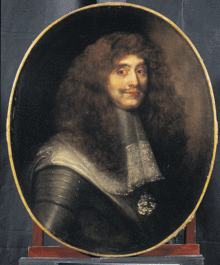Wikipedia
This text was copied from Wikipedia on 24 December 2024 at 5:10AM.
Godefroi d'Estrades | |
|---|---|
| Comte d'Estrades | |
 Godefroi, Comte d'Estrades, 17th century | |
| Born | 1607 Agen, France |
| Died | 26 February 1686(1686-02-26) (aged 78–79) Paris, France |
| Father | François d'Estrades |
| Military career | |
| Allegiance | |
| Rank | Marshal of France |
| Wars | |
| Awards | |
Godefroi, Comte d'Estrades (1607 – February 26, 1686) was a French diplomat and marshal.
Biography
D'Estrades was born in Agen. He was the son of Francois d'Estrades (died 1653), a partisan of Henry IV, and brother of Jean d'Estrades, Bishop of Condom. He became a page to Louis XIII, and at the age of nineteen was sent on a mission to Maurice of Holland.[1]
In 1646 d'Estrades was named ambassador extraordinary to Holland, and took part in the conferences at Münster. Sent in 1661 to England, he obtained in 1662 the restitution of Dunkirk. In 1667 he negotiated the Treaty of Breda with the king of Denmark, and in 1678 the Treaty of Nijmwegen, which ended the war with Holland. Independently of these diplomatic missions, he took part in the principal campaigns of Louis XIV, in Italy (1648), in Catalonia (1655), in Holland (1672); and was created marshal of France in 1675. He left Lettres, memoires et négociations en qual d'ambassadeur en Hollande depuis 1663 jusqu'en 1668, of which the first edition in 1709 was followed by a nine-volume edition (London (the Hague), 1743).[1][a]
Family
Of the sons of Godefroi d'Estrades, Jean-François d’Estrades was ambassador to Venice and Piedmont; Louis, marquis d'Estrades (died 1711), succeeded his father as governor of Dunkirk, and was the father of Godefroi Louis, comte d'Estrades (died 1717), lieutenant-general, who was killed at the siege of Belgrade.[1]
See also
Notes
- ^ See Felix Salomon, Frankreichs Beziehungen zu dem Schottischen Aufstand (1637-1640), containing an excursus on the falsification of the letters of the comte d'Estrades; Philippe Lauzun, Le Marichal d'Estrades (Agen, 1896) — Chisholm 1911, p. 801.
- ^ a b c Chisholm 1911, p. 801.
References
- This article incorporates text from a publication now in the public domain: Chisholm, Hugh, ed. (1911). "Estrades, Godefroi". Encyclopædia Britannica. Vol. 9 (11th ed.). Cambridge University Press. p. 801.




2 Annotations
First Reading
Wim van der Meij • Link
Godefroi d'Estrades was Marshal of France and Viceroy of America. He proved himself, upon many occasions, an able diplomatist, and particularly at the conferences of Nimeguen (Dutch Nijmegen), when acting as ambassador in 1673. (Warrington)
Second Reading
San Diego Sarah • Link
The first ambassador Louis XIV sent to London after the Restoration, Godefroy, Comte d'Estrades, was "a tall, cold person, with a fine figure. Few men," wrote Tallemant des Reaux in his "Historiettes," "are better endowed with cold-blooded valor; he has fought several fine duels. One day, it is reported, he fought against a certain bravado who placed himself on the brink of a little ditch saying to d'Estrades, 'I won't pass the ditch.' 'And I,' answered d'Estrades, marking a line behind him with his sword, ‘I will not pass this line.' They fought; d'Estrades kills the other."
Godefroy, Comte d'Estrades had been a page to Louis XIII, and made war in Holland and Italy. He has a taste for fighting, but it had not prevented him from entering the diplomatic service. He was entrusted with missions to England, to Piedmont, to the Dutch States, and he took part in the conferences at Munster, 1646.
Ambassador Godefroy, Comte d'Estrades reached England in July, 1661, and established himself at Chelsea.
The instructions with which he had been supplied told him to prepare a treaty with England, and contained strict guidelines as to the care he must pay to all questions of etiquette and precedence.
Louis XIV recommends "jealously to preserve the dignity of his Crown in the Court whither he is going; because any insult he may receive would in reality reflect on his master, who is bound to resent it to the utmost. ... The Sieur d'Estrades will in all occasions preserve the pre-eminence to which the King is entitled, allowing no ambassador to go before him, except the Emperor's in case he were to send one to England.
"He will allow to his left the Spanish ambassador as well as the representatives of the other kings who hold their crown direct from God alone. As for those of Venice ... he will allow them only to go behind."' -- 1 May 13, 1661.
Louis XIV’s main preoccupation was with Spain, a dreaded rival in the past, a possible prey in the future. The Most Christian King was bent upon asserting publicly, as he did privately in his instructions, his right of precedence over his Catholic brother. The fiction according to which an ambassador's person is a duplicate of the king's person was paramount and believed, so it was of great importance to Louis that Spanish Ambassador Baron de Watteville,1 the London duplicate of the King of Spain, should not be allowed to go before his Ambassador Godefroy, Comte d'Estrades.
1 From Wattenveil in Thurgovia; his name is often spelt Bateville; he died in 1670.
Spanish Ambassador Watteville lived brilliantly in York House, not far from Whitehall, spent much money, and was popular in London.
It was obvious that both were resolved, and supplied with means to maintain their pretensions, so a fight was inevitable.
Notes taken from https://books.google.com/books?id…